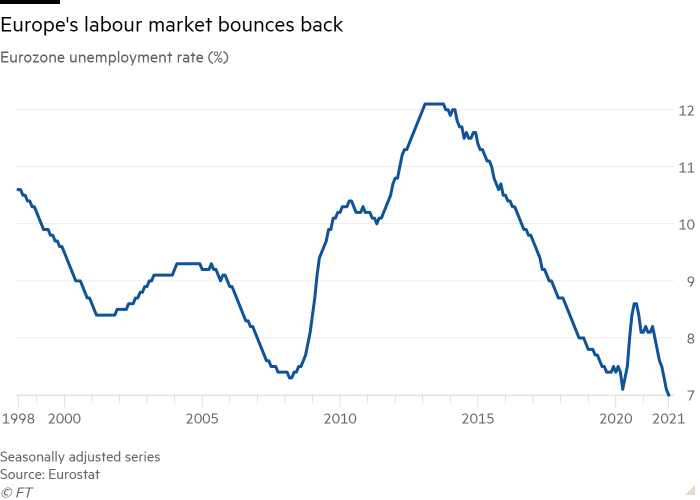[ad_1]
The head of Ireland’s central bank has said investors are wrong to bet on eurozone interest rates rising in June, predicting policymakers will be careful to avoid “killing off the recovery”.
Gabriel Makhlouf told the Financial Times that “the path to normalisation” of eurozone monetary policy had become clearer, after inflation hit a record high in the bloc while unemployment dropped to an all-time low.
The European Central Bank could stop its net bond purchases in June or a few months later, and would only raise rates after that, said Makhlouf, who is a member of the Frankfurt-based bank’s governing council.
“The idea that we could hike interest rates in June looks very unrealistic to me,” said Makhlouf. “I certainly think there’s a bit of difference between the calendar we’re working to and the one some market participants may have in mind.”
“I’m reasonably confident net asset purchases will end this year,” he added, referring to the ECB’s bond-buying programme, which has hoovered up €4.8tn of assets since it started in 2015. “The question is what is the pace at which my foot sits on the accelerator, and am I talking about June or am I talking about the third quarter.”
The Irish central bank governor is widely seen as a moderate between the “hawks” pushing for a rapid end to bond purchases and negative interest rates and the “doves” arguing in favour of continued stimulus.
His comments, in an interview with the Financial Times last week, are the latest indication that most ECB rate-setters want to avoid rushing to exit its ultra-loose monetary policy. Christine Lagarde, the bank’s president, last week played down the chances of a “measurable tightening” of policy and said any normalisation would be “gradual”.
Investors have priced in a June rate rise by the ECB since Lagarde triggered a sell-off in eurozone bond markets this month by saying inflation risks were “tilted to the upside” and there was “unanimous concern” about rising prices on its governing council.
The last time the ECB raised interest rates, in 2011, it was widely seen as a mistake, coming just as the eurozone debt crisis erupted. The increase had to be reversed with a rate cut later that year.
The 2011 rate rise was prompted by misplaced fears at the ECB that surging energy prices would have “second-round effects”, the process by which rising costs cause businesses to raise prices and workers to demand higher wages, feeding an inflationary spiral.
“There are similarities between where we are today and 2011, but there are also differences and we need to make sure that our assessment is putting the current high headline numbers [of inflation] into a broader context,” said Makhlouf, who was a finance ministry official in the UK and New Zealand before joining Ireland’s central bank in 2019.
ECB policymakers need to judge how “durable” the recent price pressures would prove, he said, adding that this was likely to hinge on whether wages start rising faster as workers respond to the rising cost of living.

“When I talk to businesses based in Ireland and multinationals, one of the top subjects that comes up every time is the dearth of talent and a tightness of the labour market for talent,” he said. “There is a bit of discussion about wage pressures, but not to the extent that I can say I have now got strong evidence of things moving.”
Wages are likely to start rising as labour markets rebound across Europe — Ireland’s unemployment rate fell from 7.7 per cent last March to 5.3 per cent in January — but Makhlouf said: “I certainly want to see fresh evidence.”
Record inflation was “impacting on households and businesses in ways they don’t want, and no one wants,” he said, adding: “We also don’t want to kill off the recovery.”
[ad_2]
Source link








